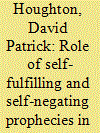| Srl | Item |
| 1 |
ID:
069621


|
|
|
| 2 |
ID:
086299


|
|
|
|
|
| Publication |
2008.
|
| Summary/Abstract |
Since the 1990s, international relations theory (IR) has supposedly been in the grip of a 'Third Debate', this time between positivism and postmodernism. While many have cast doubt as to whether this is in fact the case, and others have argued that it is time to move beyond it, it remains true to say that the issue of positivism vs postpositivism has occupied the minds of a number of academic analysts in recent years. This article takes the more radical position of questioning whether this epistemological debate - if, indeed, one accepts that there is one - has any real import in the sense of influencing the empirical research that IR scholars actually conduct. In short, whether one embraces a positivist or a postmodernist epistemology (for example) has little practical effect upon one's empirical findings. By extension, this argument suggests that the emphasis on the philosophical underpinnings of IR, while not necessarily misconceived in and of itself, has thus far not been central to what IR scholars actually do.
|
|
|
|
|
|
|
|
|
|
|
|
|
|
|
|
| 3 |
ID:
076694


|
|
|
| 4 |
ID:
090962


|
|
|
|
|
| Publication |
2009.
|
| Summary/Abstract |
As constructivists and other advocates of constitutive theories have often noted, the natural world is very different from the social one. Our ideas about the social world not only reflect that world, but help shape and create it; we are part of the reality we try to describe and explain, and we therefore have the potential to alter the reality a theory is merely intended to describe or explain. Our theories about the social world may thus become self-fulfilling prophecies or autogenetic in character, or they may self-negate. And yet while social constructivists often make this point in epistemological debates, there have been relatively few attempts so far to address its empirical implications. With that objective in mind, this paper examines two prominent IR theories-the democratic peace and the commercial peace-arguing that each has a self-fulfilling character rather than being true or false in any objective or timeless sense, as well as the potential of a currently self-negating thesis-the clash of civilizations-to become self-fulfilling; each theory is, to paraphrase the now time-honored expression, what the relevant actors make of it. The article also probes the processes by which theories become self-generating or self-negating. It is suggested that a number of frameworks developed outside political science-especially diffusion theory, memetics, social contagion theories, George Lakoff's metaphor-based model, Malcolm Gladwell's "Tipping Point" approach and social network analysis-may in combination help us understand both how political ideas spread through academic and policy communities and why particular ideas "win out" over others.
|
|
|
|
|
|
|
|
|
|
|
|
|
|
|
|